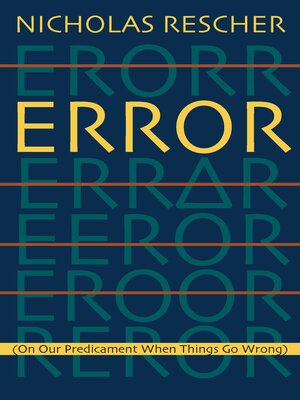
Sign up to save your library
With an OverDrive account, you can save your favorite libraries for at-a-glance information about availability. Find out more about OverDrive accounts.
Find this title in Libby, the library reading app by OverDrive.



Search for a digital library with this title
Title found at these libraries:
| Library Name | Distance |
|---|---|
| Loading... |
In <i>Error,</i> Nicholas Rescher presents a fresh analysis of the occurrence, causality, and consequences of error in human thought, action, and evaluation. Rescher maintains that error-avoidance and truth-achievement are distinct but equally important factors for rational inquiry, and that error is inherent in the human cognitive process (to err is human). He defines three main categories of error: cognitive (failure to realize truths); practical (failure related to the objective of an action); and axiological (failure in evaluation), and articulates the factors that contribute to each. His discussion also provides a historical perspective on the treatment of error in Greek philosophy, and by later thinkers such as Aquinas, Descartes, Spinoza, Leibniz, James, Royce, Moore, and Russell. <i>Error</i> is an important reexamination of the significance of error to the fields of philosophical anthropology, epistemology, ontology, and theology. As Rescher's study argues, truth and error are inexorably intertwined—one cannot exist without the other. Error is an unavoidable occurrence in the cognitive process—without missteps on the path to truth, truth itself cannot be attained. The risk of error is inherent in the quest for truth.







